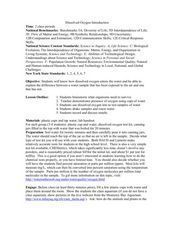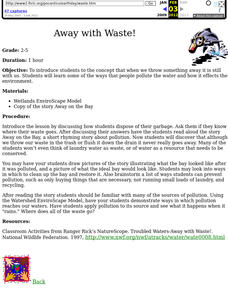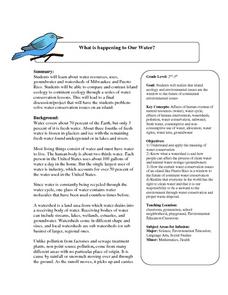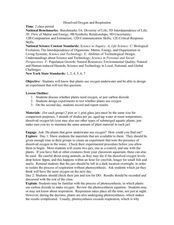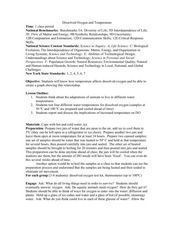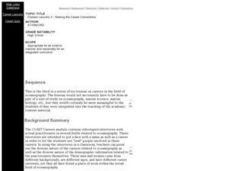Curated OER
Dissolved Oxygen Introduction
Students are shown how dissolved oxygen enters the water. They are taught the difference between a water sample that has been exposed to the air and one that has not. Students brainstorm what organisms need to survive. They use dissolved...
Curated OER
Subsurface Contamination of Groundwater
High schoolers watch a demonstration with a balloon filled with water being buried in a milk container that has been cut length wise and filled with sand. Students are told that there is an underground storage tank filled with a...
Curated OER
Settling The Wasterwater Problem
Learners name models that are representations of larger objects. They suggest ways that industry, agriculture, and mining affect water quality. Pupils demonstrate the use of lagoons for treating wastewater. Students define the...
Curated OER
Runoff: Intro to Watersheds
Students are taught that a watershed is, what types of basic land cover are impermeable and permeable to water. They trace the flow of water around their school and around their home. Students determine what watershed their school is a...
Curated OER
Away with Waste!
Students read and analyze the story Away on the Bay as a springboard to discuss water pollution. They may look into ways in which water can be cleaned and a watershed restored.
Curated OER
Stream Watch
Students discuss why it is important to take care of streams, what is non-point source and point source pollution, what are some causes of pollution in streams, and what can we do to prevent some of these causes of pollution? They steam...
Curated OER
Watershed Model
Young scholars view a presentation of water and land and how we need to protect our water resources. In this water lesson plan, students discuss how we rely on water, and complete activities in all subjects related to water.
Curated OER
Is Your Water Clean?
Learners compare water quality of different sources. They test water samples for odor, phosphates, pH, bacteria, and dissolved solids. they fill out a data table and answer questions about their findings.
Curated OER
Pollution Solutions
Students visit a local park to test the quality of the aquatic environments. They search for sources of pollution and examples of pollution control. Based on their obeservations and experiments, they rate their local environment.
Curated OER
What is Happening to Our Water?
Learners compare and contrast Wisconsin's water resources to that of Puerto Rico. They research books about islands, particularly the Puerto Rican islands. Student view illustrations of island ecology. They discuss the illustrations and...
Curated OER
The Chesapeake Bay in Captain John Smith's Time
When Captain John Smith visited the Chesapeake Bay in the summer of 1608, what types of animals and habitats did he encounter? Your young historians will analyze primary source documents to answer this question, as well as compare the...
Curated OER
Rice Farming
Third graders investigate how farmers get more rice from their land. In this farming lesson, 3rd graders discover things that farmers to do produce more rice. Students study photosynthesis and illustrate pictures about it. Students test...
Curated OER
Not So Neutral Views
Young scholars explore ways to use indicators to distinguish between acids and bases. They conduct an experiment to model and discuss the harmful effect of acid rain in our living and non-living environment.
Curated OER
Dissolved Oxygen and Respiration
Students are presented with the question, "Do plants that grow underwater use oxygen?" They create an experiment to test the presence of dissolved oxygen in the water using provided materials. Student experiments include a control jar as...
Curated OER
Clean, Green Power
Students explore and discuss alternative energy sources, and identify disadvantages of current fossil fuels.
Curated OER
Dissolved Oxygen and Temperature
Students are shown how temperature affects dissolved oxygen and they create a graph showing this relationship. They think about the adaptations of animals to live in different water temperatures. Students test four different water...
Curated OER
Renewable vs. Non-Renewable Resources
Here's a fine lesson on renewable and non-renewable sources of energy for your 5th graders. In it, learners list a number of natural resources on the board, then try to sort the resources into appropriate categories. This helps them to...
Curated OER
Language Arts: How Can Research Shape Ideas?
Learners are able to characterize arsenic and determine its potential health threats in writing. They are able to compare and contrast arsenic to other water pollutants using Venn diagrams. Students are able to demonstrate essay skills...
Teach Engineering
The Great Pacific Garbage Patch
The Great Pacific Garbage Patch is one of several garbage patches around the world where garbage accumulates naturally. As part of a GIS unit that combines oceanography, environmental science, and life science, class members investigate...
Curated OER
WHAT'S ORGANIC?
Learners explore how certain foods come to be certified "organic." They write the words "organic" and "synthetic" and given the definitions of each. Students are given dictionaries. They are asked: "What is organic food?" Learners grow...
Curated OER
Environment: Just Around the Bend
Students decipher landforms on a map and corresponding satellite imagery. They consider the impact of pollution on agriculture and water. They draw diagrams demonstrating how pollution works its way into the food source.
Curated OER
Karst Topography
Students observe a movie about karst topography over the Internet and note nonpoint source pollution. They discuss ways to manage pollution and their experiences with any polltion sources.
Curated OER
Science: Making Career Connections
Students explore careers in oceanography. They compare and contrast requirements for careers in the field, and determine what high school courses would help to prepare them. Finally, they create a computer-based project related to...
Curated OER
Erosion
Fifth graders study the effects of running water on erosion. They examine how the soil on the playground is affected by erosion and determine how the placement of trees and shrubs changes the path of erosion. In their science journals,...


